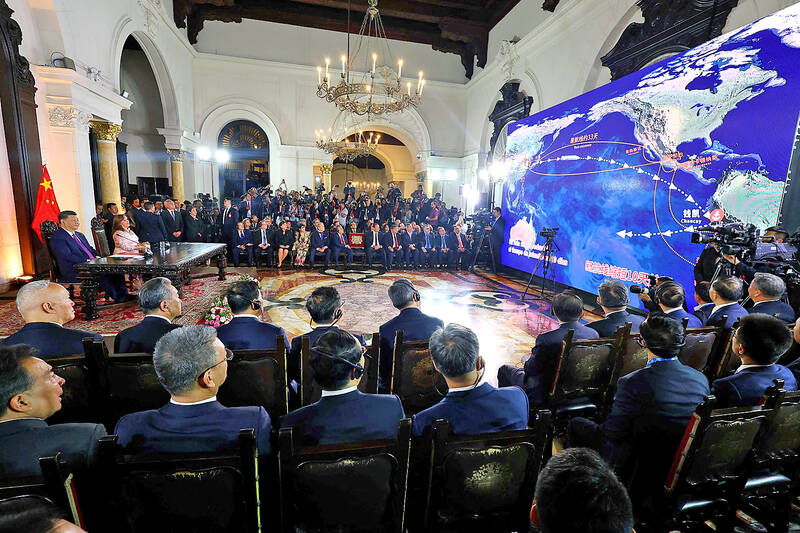Chinese President Xi Jinping (習近平) launched a week-long diplomatic blitz of South America on Thursday by inaugurating a massive deep-water port in Peru, a US$1.3 billion investment by Beijing as it seeks to expand trade and influence on the continent.
With China’s demand for agricultural goods and metals from Latin America growing, Xi will participate in the APEC summit in Lima then head to the Group of 20 summit in Rio de Janeiro next week, where he will also make a state visit to Brazil.
Xi and Peruvian President Dina Boluarte participated on Thursday by video link in the opening of the Chancay port, about 80 km north of Lima on the Pacific Ocean, and signed a deal to widen an existing free trade agreement.

Photo: AFP
Xi said that Chancay, a 15-berth, deep-water port, was the successful start of a “21st century maritime Silk Road” and part of China’s Belt and Road Initiative, its modern revival of the ancient Silk Road trading route.
“China is willing to work with the Peruvian side to take the Chancay project as a starting point to forge a new maritime-land corridor between China and Latin America and connect the Great Inca Trail,” Xi said, referring to a 15th century mountain network that joined the Inca empire.
In an opinion article in the El Peruano state newspaper, Xi said the Chancay project would generate US$4.5 billion in annual revenues, create more than 8,000 direct jobs and reduce the logistics costs of the Peru-China route by 20 percent.
The China-controlled megaport was built by Cosco Shipping Ports and received US$1.3 billion in Chinese investment for its first phase. China is expected to spend billions more as Beijing and Lima work to position it as a major shipping hub between Asia and South America.
The first ship was due to set sail from Chancay next week, transporting Peruvian fruit to China, Mario Ocharan, Peruvian director of the Chancay Chamber of Commerce, said.
China’s main motivation for developing the megaport, according to Ocharan, was access to neighboring Brazil, where a new railway line is planned to carry Brazilian exports such as soybeans and iron ore to the port.
The rail project is estimated to cost US$3.5 billion, according to Mario de las Casas, corporate affairs manager at Cosco Shipping Chancay Peru. Building that link is “crucial” to improve transportation of soybeans as Brazil is the top seller of the commodity to China, he said.
The inauguration of the port comes as Beijing is looking to further tap into resource-rich Latin America, amid trade tensions with Europe and concerns about future U.S. tariffs on Chinese exports from the incoming Trump administration.
China’s major investment in Chancay has raised alarm bells in Washington. General Laura Richardson, former US Southern Command chief, warned earlier this month that Chancay could be used by the Chinese navy and for intelligence-gathering.
US anxieties about Chancay reflect a broader, decades-long shift in a region Washington long saw as its backyard. China has overtaken the United States to become the largest trading partner of countries like Peru.
China’s state-backed Global Times wrote in an editorial on Monday that the port was “by no means a tool for geopolitical competition”, calling US accusations of the port’s potential military use “smears.”

Yemen’s separatist leader has vowed to keep working for an independent state in the country’s south, in his first social media post since he disappeared earlier this month after his group briefly seized swathes of territory. Aidarous al-Zubaidi’s United Arab Emirates (UAE)-backed Southern Transitional Council (STC) forces last month captured two Yemeni provinces in an offensive that was rolled back by Saudi strikes and Riyadh’s allied forces on the ground. Al-Zubaidi then disappeared after he failed to board a flight to Riyadh for talks earlier this month, with Saudi Arabia accusing him of fleeing to Abu Dhabi, while supporters insisted he was

The Chinese Embassy in Manila yesterday said it has filed a diplomatic protest against a Philippine Coast Guard spokesman over a social media post that included cartoonish images of Chinese President Xi Jinping (習近平). Philippine Coast Guard spokesman Jay Tarriela and an embassy official had been trading barbs since last week over issues concerning the disputed South China Sea. The crucial waterway, which Beijing claims historic rights to despite an international ruling that its assertion has no legal basis, has been the site of repeated clashes between Chinese and Philippine vessels. Tarriela’s Facebook post on Wednesday included a photo of him giving a

Syrian President Ahmed al-Sharaa on Sunday announced a deal with the chief of Kurdish-led forces that includes a ceasefire, after government troops advanced across Kurdish-held areas of the country’s north and east. Syrian Kurdish leader Mazloum Abdi said he had agreed to the deal to avoid a broader war. He made the decision after deadly clashes in the Syrian city of Raqa on Sunday between Kurdish-led forces and local fighters loyal to Damascus, and fighting this month between the Kurds and government forces. The agreement would also see the Kurdish administration and forces integrate into the state after months of stalled negotiations on

‘MOBILIZED’: While protesters countered ICE agents, Minnesota Governor Tim Walz activated the state’s National Guard to ‘support the rights of Minnesotans’ to assemble Hundreds of counterprotesters drowned out a far-right activist’s attempt to hold a small rally in support of US President Donald Trump’s latest immigration crackdown in Minneapolis, Minnesota, on Saturday, as the governor’s office announced that National Guard troops were mobilized and ready to assist law enforcement, although not yet deployed to city streets. There have been protests every day since the US Department of Homeland Security (DHS) ramped up immigration enforcement in the Twin Cities of Minneapolis and Saint Paul by bringing in more than 2,000 federal officers. Conservative influencer Jake Lang organized an anti-Islam, anti-Somali and pro-US Immigration and Customs Enforcement